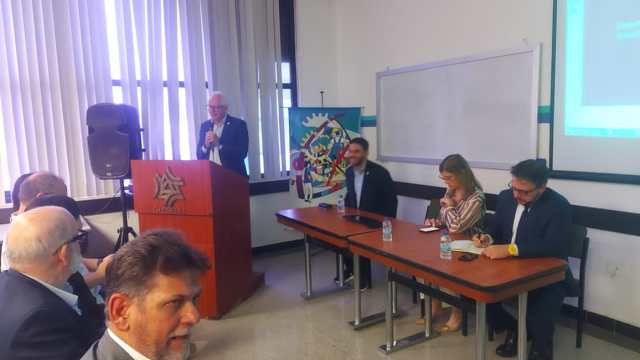
Representatives of the regional and national business unions (Fedecamaras) met in Valencia, Carabobo State, to present the economic prospects for 2024.
lapatilla.com correspondent
The President of the Venezuelan Confederation of Industrialists (Conindustria), Luiggi Pisella, pointed out that economic growth scenarios are subject to several factors, among which what may happen with the relaxation of sanctions stands out.
He explained that in the best case scenario, they estimate growth of around 10% this year, while in the least encouraging scenarios the figure is between 4.5% and 2%.
“There is an influence, even if unwarranted, on the issue of the relaxation of sanctions (…) But everything will depend on how things evolve between now and the month of April, by then we will have means to better estimate a scenario of what may happen in the country,” he considered.
Pisella affirmed that industries have continued producing despite all the difficulties they face.
“If we don’t have electricity, we generate it. And if we don’t have fuel, incredibly it appears, but we pay for it at a higher cost, which, as I said, makes us less competitive. But we are determined on expanding the economic diversification of the country, we are determined to contribute,” he expressed.
He reiterated the union’s request to eliminate the Large Financial Transactions Tax Law (Igtf) so that the sector can achieve greater growth.
“We have made progress on the issue of smuggling, on the issue of eliminating exemptions for imported products, and thus we are going to become more competitive. And there are many more laws to continue advancing,” he said.
Public services and financing
For her part, the president of Fedecámaras Carabobo, Ana Isabel Taboada, stated that the constant failures and deficiencies in public services also affect the development of business activity.
“If the electrical problem continues, this has many effects on the entire business activities. This has to be done (managed) in a structural way (electrical outages). These cannot be these 4 or 5 hours long every day and cause that there to be no production, because it also makes all products more expensive,” she pointed out.
Added to this is the difficulty in obtaining fuel. “You can’t tell a producer: today I don’t harvest the tomato, today I don’t plant, today I don’t start the irrigation system, because I don’t have the fuel to be able to do it, I don’t have the machinery,” she commented.
The President of Fedecámaras Carabobo indicated that they require financing to be able to make investments in some areas such as infrastructure, training and technology. She stressed that the small investments they have been able to make come out of the pockets of the businessmen.
Tax pressure
The First Vice President of Fedecámaras, Felipe Capozzolo, pointed out that a recurring complaint in the different chambers of commerce and industry in the country is the very high tax pressure.
He mentioned that local authorities and business representatives must seek agreements that allow companies to be economically viable, lower fiscal pressure and convert municipalities into localities focused on increasing production and so generate jobs.
“We must expand the tax base and to do so there must be fair taxation that allows, that are necessary to be able to provide services, to be able to create conditions in the municipalities so that companies can grow and fulfill their mission, that It is the commitment to the country to generate prosperity,” he pointed out.
He assured that the business sector is focused on working every day for the diversification of the economy. Furthermore, he considered it necessary to increase Venezuela’s non-oil export potential to create more companies and jobs.
“Oil will continue to be used as a lever, but we are focusing more on the productivity that micro-enterprises can generate by forming productive chains with an export vision, applying new business models, incorporating technology, incorporating speed of change, a collaborative economy so that we can take Venezuelan products and Venezuelan talent manifested in products and not in people abroad,” he stated.

